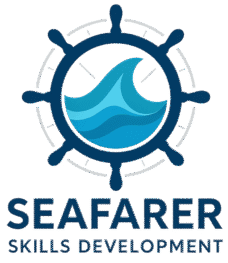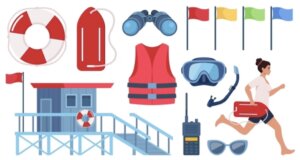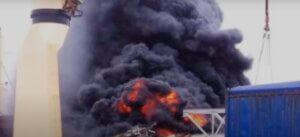Fire safety on board isn’t something I ever take lightly. Whether I’m docking for the night, setting off on a long trip, or just spending an afternoon out on the water, fire is a real risk that can quickly turn a pleasant time into an emergency. Knowing how to prevent fires and being ready to respond if one starts is super important. Here’s what I’ve learned about keeping any boat safe. I’ll cover following fire safety regulations, keeping up with new tech and training, and the daily habits that matter most.
Why Fire Safety on Boats Demands My Attention
Fires on boats are more dangerous than fires on land because you have limited exits and a small space fills up with smoke fast, making it tough to get out safely. There are lots of ignition sources: fuel lines, electrical wiring, cooking appliances, or even an unattended cigarette. The U.S. Coast Guard has reported that a significant number of boating accidents each year are caused by fires, with many of them preventable if you’ve got the right knowledge and preparation.
I’ve witnessed how a small spark or fuel leak can escalate so quickly. Being prepared doesn’t just make sense—it gives me peace of mind every time I step on board. Routine checks, proper equipment, and an aware crew have a bigger impact than many realize. There’s no such thing as being too prepared when it comes to fire safety at sea.
Understanding Fire Safety Regulations for Boats
Following fire safety rules is a basic part of my responsibility as a boat owner or crew member. Agencies like the U.S. Coast Guard, the International Maritime Organization (IMO), and national maritime bodies set the standards. These cover everything from what type of fire extinguishers you need, to where they go, and how often to check your systems.
Regulations depend on the size and class of your boat, but some standards apply to everyone:
- Approved and easy-to-reach fire extinguishers in important spots
- Clear, well-marked escape routes and emergency exits
- Well-kept fuel and electrical systems
- Current documentation and upkeep logs
Rules change regularly as new technology rolls out or accidents lead to new guidelines. I always make it a point to keep up with Marine Fire Safety Regulations Update publications. These might mean you need different gear or update how your crew trains. Missing an update can risk lives, rack up fines, or keep your boat in port until you fix the issue.
Common Causes of Boat Fires
If you know what usually causes a boat fire, you can catch problems earlier. Here are some of the main trouble spots:
- Electrical problems: Frayed wiring, overloaded outlets, or corroded connectors can spark trouble. Giving my boat’s wiring a quick look-over as part of my checklist really helps reduce risk.
- Fuel leaks: Gasoline and diesel are both highly flammable, and even the fumes can ignite. Checking for leaks and fixing cracked hoses keeps things safer.
- Galley trouble: Leaving the stove unattended or storing flammable items too close to heat sources is a recipe for a fire. I always stay put while cooking and keep my galley clear.
- Heating and cooling mishaps: Badly working air conditioning, space heaters, or engine heaters might break down or overheat.
- Forgotten equipment: Outdated fire extinguishers or alarms, or not having a working detection system, can mean you’re caught off guard.
Fire Safety Training for Crew Members
Everyone on board should know exactly what to do if there’s a fire. I never just assume people know, so I take Fire Safety Training for Crew Members very seriously. Typical training covers:
- How to use different fire extinguishers for basic, liquid, or electrical fires
- Learning evacuation routes and muster locations
- How to quickly alert others and call for help
- How to cut off fuel and power safely
- First aid basics, especially for burns and inhaling smoke
I also run practice drills with the whole crew—even guests and newcomers—so no one is caught off guard. Drills reveal weak spots, like blocked exits or poorly placed extinguishers, allowing me to fix them before they matter.
How to Prevent Fire on Boats: Tips and Daily Habits
Your best bet is prevention, and I have a set of daily habits I refuse to skip:
- Look over fuel systems for leaks and wear before every outing
- Switch off all unused electrical gear
- Store gasoline, solvents, and other flammable liquids in the right containers, away from heat
- Keep galley tidy and stay present while cooking
- Regularly test all smoke and carbon monoxide alarms
- Swap out wiring or battery connections that look iffy or corroded
It might seem obsessive, but skipping these checks even once could mean much bigger headaches down the line.
Fire Safety Checklist for Sailboats
I won’t leave the dock without running through my Fire Safety Checklist for Sailboats. Here’s my essential list, which you can tweak as needed:
- Check all extinguishers for pressure and right placement
- Test smoke alarms and carbon monoxide detectors to make sure they work
- Double-check that escape routes aren’t blocked
- Test the bilge blower before starting your engine on gas-powered boats
- Check fuel lines, valves, hose clamps, and tanks for leaks or weakness
- Review fire drill roles with everyone, and confirm evacuation plans
- Make sure emergency radios or cell phones are charged and easy to grab
This checklist changes if I install new gear, fix something major, or find new advice in safety guides. Staying flexible and updating as needed is key to staying safer.
How to Respond to a Boat Fire
If a fire breaks out, moving fast but keeping calm is what matters most. Here’s how I handle it:
- Sound the alarm—alert everyone quickly by shouting, horns, or alarms.
- Try to see where the fire started, but only if it’s safe.
- Decide if it’s possible to put out the fire with an extinguisher or if evacuation is safer.
- Pick the right extinguisher—never use water on fuel or electrical fires.
- If the fire is too much, get everyone in life jackets, lead them away from flames and upwind of smoke.
- Send out a mayday using VHF channel 16 or a cell phone.
- Be ready to abandon ship if you must and can’t control the fire.
Afterwards, have emergency teams and the coast guard look things over before anyone goes back on board. Only reboard when you know it’s safe.
Fire Safety Technology Innovations 2025
New tech is making boating safer each year. Fire Safety Technology Innovations 2025 trends include smaller, automatic suppression systems that use non-toxic gas or foam and fit in tight spots like engine rooms, galleys, or electronics panels. Smart sensors now spot heat, smoke, or gas leaks more quickly than traditional models. Some boats have Wi-Fi-connected safety setups, alerting me by phone if something’s wrong, even when I’m not aboard.
Other advances are popping up too, like marine-rated fire blankets, easy-to-use nonrechargeable extinguishers that cut down on maintenance, and better links with boat monitoring gear. Upgrades are showing up not just in brand new boats but as aftermarket add-ons. Following the Marine Fire Safety Regulations Update news helps me decide which of these make sense to install.
Things I Always Consider Before Committing to a Fire Safety Plan
Picking the right mix of safety gear and rules can feel overwhelming. Here’s what I always run through to make things practical:
- Boat size and design: A little sailboat has very different needs from a large motor yacht. I adjust my checklist for how much room I have and what kind of trips I take.
- Age and system types: Older boats can have more worn parts or outdated wiring, so I plan for extra checks and possible upgrades.
- Local laws: Requirements change depending on your state, country, or even specific marina. Double-checking brings peace of mind, especially if sailing somewhere new.
- Crew experience: When I have less experienced people on board, I spend more time on drills and safety walk-throughs.
I always go over my safety setup with insurance too. Some policies need proof of certain gear or training, and being proactive can make any claims process much smoother.
Fire Extinguishers: Types and Placement
The right number and kind of extinguishers matter. Boats typically need a minimum of two, but bigger boats need more. Key spots are visible and quick to grab: near the galley, engine compartment, and living areas. Whenever I buy extinguishers, I check for a U.S. Coast Guard approval and make sure inspections are up to date for reliability.
Fire Detection and Suppression Systems
Automatic fire suppression isn’t just for giant boats now. I put compact automatic setups in tight places like the engine compartment, so a fire gets handled even if I’m not right there. Linked smoke and carbon monoxide alarms matter too. Monthly tests keep them trustworthy, and I check them more often before long trips. Adding these systems was one of the smartest choices I’ve made for boat safety.
Frequently Asked Questions
Here are some of the most common questions I hear from other boaters:
Question: Are fire safety rules really checked for private boaters?
Answer: Yes. Most marinas and many local authorities will check your safety gear and paperwork, and ignoring the rules can also affect your insurance and safety.
Question: What if I don’t know how old my extinguishers are?
Answer: If you’re not sure about your extinguishers, get new ones. Older extinguishers might not work when you need them, and your safety depends on reliable equipment.
Question: How do I keep up-to-date with Marine Fire Safety Regulations Update info?
Answer: Sign up for updates from your coast guard, safety newsletters, or manufacturers’ websites to catch the latest rules and technology changes.
Final Thoughts and Why I Keep Fire Safety Front-of-Mind
Fire safety on board isn’t a one-and-done task. I check my plan often—when the crew changes, when I change gear, or when new rules come out. I repeat Fire Safety Training for Crew Members every year and follow my Fire Safety Checklist for Sailboats without fail. Keeping up with Fire Safety Technology Innovations 2025 means I’m stopping problems before they can even start. Preparing for fire is more than just legal work—it’s how I look out for everyone who sets foot on my boat and keep every adventure safe.








Reading this, I kept thinking about growing up in South Sudan, where one careless spark from a kerosene lamp could turn a whole tukul into ashes, and how that same mix of fuel, heat, and tight space becomes even more serious on a boat.
I like how you turned fire safety into a daily habit, not just a box to tick, because that is the only way people really stay ready in an emergency.
How would you adapt your checklist and drills for guests who are completely new to boats, so they do not panic or get in the way if a fire breaks out. I’m just curious about this.
John
John, thank you for sharing that. Your point about the kerosene lamps in South Sudan really resonates — it’s a powerful reminder that fire risk feels very different when you’ve lived close to it. And you’re absolutely right: on a boat, that same combination of fuel, heat, and confined space can turn small mistakes into real danger fast.
For guests who are completely new to boating, I try to keep things simple and calm. A few things that seem to work well:
1. A 2-minute safety brief the moment they come aboard.
Nothing dramatic — just where the extinguishers are, where to move if I say “fire,” and what not to touch. If people know what to expect, they freeze less.
2. A “follow me, don’t fight the fire” rule.
New guests often think they should grab an extinguisher, which usually causes more chaos. I tell them clearly: your job is to follow my voice and stay clear so I can work.
3. A simple phrase for emergencies.
Instead of shouting “fire,” I use a rehearsed cue like: “Everyone forward now.” It keeps people from panicking, because they’re executing a familiar instruction rather than reacting to alarm words.
4. A quick walkthrough of escape routes.
Even just pointing out, “If anything happens, go this way,” gives people an anchor under stress.
5. Reassurance.
Newcomers panic when they feel useless. I give them one clear responsibility — “Stay here and wait for my instructions” — so they feel part of the process rather than overwhelmed by it.
It doesn’t take long, but it makes a big difference. Once people understand what not to do, everything becomes calmer and safer.
Really appreciate your perspective — thanks again for sharing it.
This was an insightful and informative post. I hadn’t realized how many different ignition sources exist on boats, from wiring and fuel lines to something as simple as cooking in the galley.
The idea of conducting practice drills with everyone on board, including guests, makes sense. In an emergency, preparation could be the difference between panic and a calm response. I’m curious, do you think that newer technologies like automatic fire suppression systems or smart detectors make a significant difference compared to traditional extinguishers and alarms?
Thank you for sharing such practical advice; it really emphasizes how prevention and readiness are essential when it comes to fire safety at sea.
Thank you so much for the thoughtful comment! You’re absolutely right—boats are full of potential ignition sources that are easy to overlook, and it’s often the small, everyday things that can pose the biggest risks.
Practice drills really do make a huge difference. Even a simple walk-through can help everyone stay calm and know exactly what to do if something unexpected happens.
As for newer technologies, yes—automatic fire suppression systems and smart detectors can significantly enhance safety. They react faster than humans typically can, especially in areas that aren’t constantly monitored, like engine compartments. That said, they work best as supplements, not replacements. Traditional extinguishers, alarms, and good old-fashioned vigilance are still essential.
I’m glad you found the post useful! Prevention and preparation truly are the best ways to stay safe at sea.
Such valuable information, and so many things to take into consideration. I really like this article! The information you present is very concise, contains much value and answers many questions. Fire Safety is something that no one should ever take lightly and it’s necessary to have a well laid out plan. I like how you emphasize to importance of not just the plan but the importance of checking systems on a regular basis.
I am not a boater, but I do spend time with friends that invite me onto vessels. After reading this article, I think I will find a way to ask the “captain” what about fire safety and what I need to know or understand as to my role. Fire Safety is everyone’s responsibility!
Thank you for taking the time to put together such an insightful article on an important topic! I am looking forward to future reads!
Thank you so much for your thoughtful comment — I really appreciate your kind words!
You’re absolutely right: fire safety is something that should never be overlooked, whether you’re the vessel owner or a guest on board. Having a clear plan is essential, but keeping systems checked and maintained is just as important, and I’m glad that part resonated with you.
It’s great that you’re thinking about asking the captain about fire safety during your next outing. That kind of awareness can make a real difference, and you’re spot on — fire safety truly is everyone’s responsibility.
Thanks again for taking the time to share your insights and for following along. I’m glad you found the article valuable, and I look forward to sharing more helpful content with you!